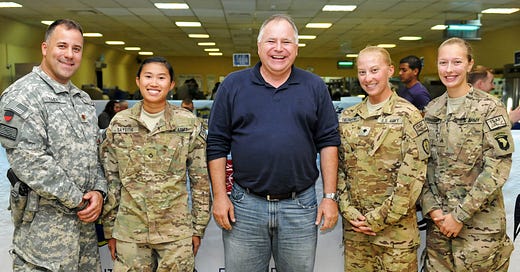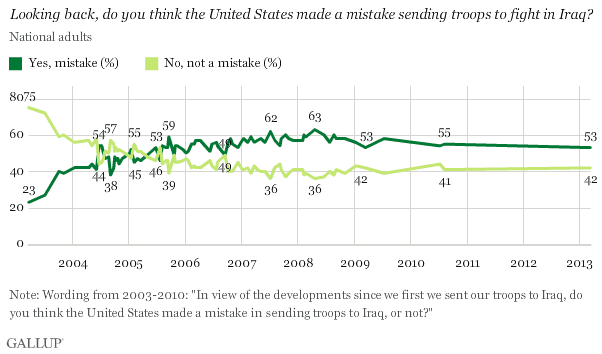On Why Tim Walz Left the Military
A lot of the criticism is unfair but there’s one point he should address
Tim Walz is the only retired enlisted person to ever stand as a presidential level nominee of one of the two major parties and yet the Trump camp and partisan blowhards are trying to turn that into a negative. After 24 years serving the country as a National Guardsmen, Walz left his unit in the lurch by retiring just as it was facing the Iraq war, so the argument goes. Thus he’s accused of having “slithered out the door.”
Tim Walz is one of the only ten percent of enlisted soldiers in the U.S. military who serve until retirement. His 24 years of service is exceptionally long compared to his Army peers, nearly 30 percent of whom don’t make it past 3 years. He did what many choose not to do, or cannot do. Yet in contrast to his lengthy service, Walz’s experience in the military was in many respects strikingly ordinary.
Most evident is Walz’s decision to serve as an enlistee, the non-officer corps that accounts for over 80 percent of all service members and is the military’s path of choice for the working class who lack a college degree. Less obvious, though, is how typical his choices were during the run-up to the Iraq War. Consider, for example, his decision to defer his retirement and re-enlist after 9/11. This placed Walz among the over 180,000 other Americans who enlisted after 9/11, many spurred to action by a sense of patriotism. That might seem naive in retrospect, but the patriotic fervor in the immediate aftermath of the attack was palpable even to the apolitical 7th-grade version of me. Walz could have retired quietly after 20 years (though Republicans would probably criticize him for that as well, even though, as an artilleryman, it wasn’t as if his skill was in need in 2001.)
Also quite ordinary was Walz’s disillusionment with the second Gulf War that followed the fighting in Afghanistan. Walz’s public criticisms of the war began, so far as I can tell, in 2006, the same year that a clear and consistent majority of Americans began to oppose the war.
During his campaign for Congress that year, Walz delivered what NPR then called “an authoritative critique of the war” that became “a centerpiece of his campaign.” NPR’s local affiliate called the Iraq War his “biggest issue,” citing his call for “an exit strategy for the country’s troops.” He also pushed Democratic party leadership to use Congress’ “power of the pursestrings” to pull back from the war.
Though Walz retired from the military the year before his 2006 campaign, Walz didn’t face any of the criticism he’s facing today. It’s obvious why: the war was an active political controversy at the time and a liability for incumbent Republicans. No one was going to bat an eye at someone eligible for retirement bowing out because they didn’t support Bush and Cheney’s disaster. But with the start of the Iraq war now 20 years old, people seem to have forgotten what it was like then.
If any aspect of Walz’s service is deserving of criticism, it’s his reluctance so far to explain his decision to end his time with the Army. The military isn’t the mafia, you don’t swear a blood oath until the day you die. Under our volunteer Army system, your oath lasts until your next contract (if you extend) and then actually expired when you’re eligible to retire (which for an enlisted many is 20 years). There are lots of reasons people decide to retire — health, family, money, fed up ness with the military, education choices, job opportunities, disagreements with policy, moral opposition to war. Ask anyone who’s served; cowardice hardly comes up. But Walz has so far been silent about his decision to retire, and it is baffling.
Without telling the story of his retirement, his detractors are free to fill the void with their own story. And that’s exactly what’s happening. Walz’s reticence on this matter clashes with the Minnesotan’s brand of the plainspoken, guileless Midwestern everyman. Whether he has the candor to address it will be an interesting test of his willingness to stand up to the national security heads in Washington who I’m sure are advising him that, Sir, if you say you retired because the war was stupid, people might think you’re a pinko.
A retired soldier friend of mine (who himself enlisted because of 9/11) once told me about a particularly hairy firefight he was in while deployed to Afghanistan. We confided things in each other that we wouldn’t to most people. So I asked if he was scared, knowing he would answer honestly. He laughed and said, “Hell yeah I was scared!” The remark didn’t diminish his courage; it made clear how dire the situation must have been. And above all, I respected his honesty.
If Walz chooses to tell his personal story rather than his political one, it will be the measure of a human being rather than a politician.





Walz's critique of the Iraq War, from the standpoint of a veteran who spent decades in the military, should be enough to make him an American hero. One hopes he will continue to heed the example of other contemporary heroes who dedicated their lives to higher principles, like Aaron Bushnell. I wrote about his profound act of dissent and conscience, which should shame every elected leader who supports the ongoing genocide in Gaza. https://shahidbuttar.substack.com/p/dont-look-away
It's interesting that the last Democrat to run for the White House having publicly opposed the Iraq War went on to win it, only to then backtrack and buttress the military-industrial complex at every opportunity (while reviving Joe Biden's then moribund career) once he got in office. https://shahidbuttar.substack.com/i/140911089/obamas-obfuscations.
Ultimately, weapons sales and militarism are at the core of the Washington consensus that unites the corporate political parties and their duopoly. https://shahidbuttar.substack.com/p/weapon-sales-unite-washingtons-warring. In that context, Walz offers a different example—one emphasizing service, rather than his own self-aggrandizement, or transactional service to a set of industries. Beyond his various positions, that theme might present the greatest significance of his vice-presidential candidacy. https://shahidbuttar.substack.com/p/a-senior-democrat-notes-how-career
We don't have political parties. We have political cults. The whole point behind an army in a free county is to protect the country. It is not to execute some fruitcake foreign policy cooked up by some congresscritters.YOU'RE NOT OBLIGATED TO SERVE IN THE MILITARY. I served 4 years in the AF during 'nam. I discouraged all 6 of my kids from entering the military (successfully). I told them that if they felt the country faced an existential threat from somewhere, by all means enlist. Otherwise, they should find their cannon fodder elsewhere.